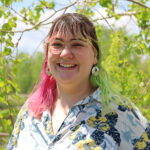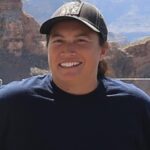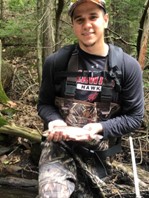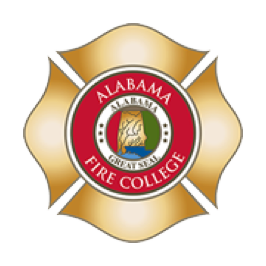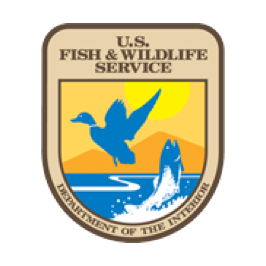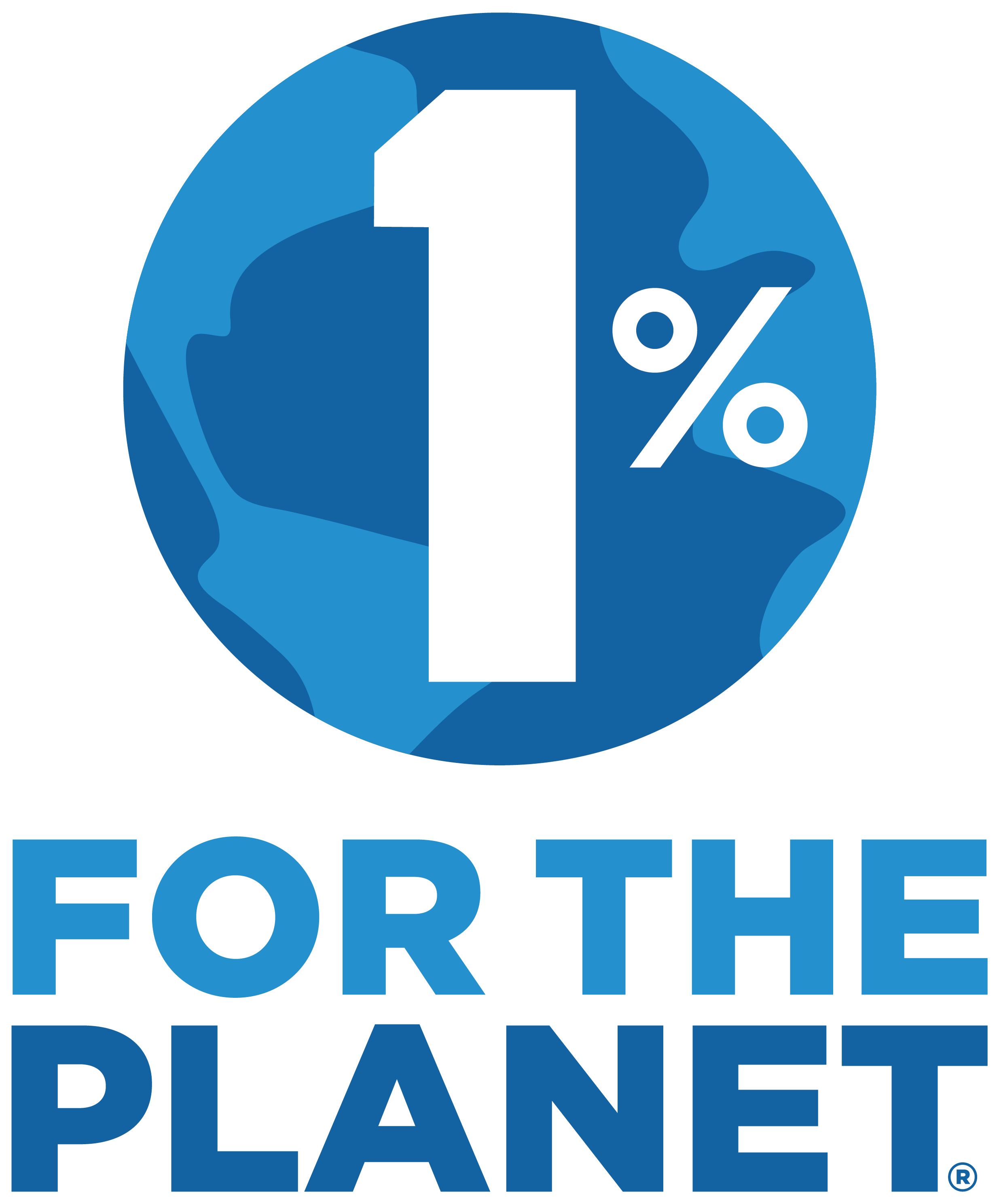Summer 2023 – From the Eagles Nest Newsletter
From the Eagle’s Nest
Summer 2023
What an incredible season of growth we’ve experienced over the past 3 months! We’ve enthusiastically welcomed some more amazing additions to our team, and have been diligently providing technical assistance on the grant front and offering valuable professional development opportunities. As we look ahead to the next 3 months of 2023, we are filled with excitement and anticipation for the opportunities and achievements that lie ahead!
Featured Articles
Message from the Outgoing President- Elveda Martinez
Message from the President
Message from the Executive Director
Message from the outgoing Public Information Officer
40th Annual Celebration
Conservation Law Enforcement Update
America the Beautiful Challenge Update
Recovering America’s Wildlife Act (RAWA)
Staff Additions
Education Update
The Bio Corner
Invasive Species
Funding Sources
Strategic Operating Plan Survey
Upcoming Events & Jobs
NAFWS in the News
Message from the Outgoing President
Happy Summer! I think we had the longest winter in history. Living in the desert, it was great to see the snow on the Sierra Mountains, as that feeds our Walker River that travels through our reservation to our Walker Lake, known as Agai Pah (Trout Lake). We’ve been in a drought for years and to see record setting snow on the mountains was great and a little scary. Apparently, this hasn’t happened since 1906. Since early this year, we’ve been preparing for flooding here in our community. So far, so good. We’ve had some farmlands flood and a lot of erosion of the riverbanks, but all homes and tribal facilities have been spared.
Coming from a reservation with limited staff, we’ve all had to wear multiple hats during this high water emergency. There have been many emergency meetings with the State of Nevada Emergency Management, FEMA, upstream counties and towns and our local emergency team. I’ve taken on the role of the Public Information Officer. Then we’ve been dealing with Weber Dam (owned by the BIA) and the possibility of a spillway failure. We’ve had to deal with lack of communication and the fear of major flooding should that happen. BUT, through it all (so far) we’re safe and our lake is getting much needed water; it’s raised in elevation by 14 feet so far. The birds are back along with a lot of other insects that we haven’t seen in years…grasshoppers, dragonflies and our favorite – the mosquito. Now we have hope that the Lahonton Cutthroat Trout will come back, as our lake fishery has been non-existent for 10+ years due to the lack of water and high salinity.
When I think of my time as President of the Society, since 2019, I think of change and growth. Isn’t that what happens with our world, climate, birds, fish, people and all beings? I came in as the President when we had $250,000.00 of BIA money and pretty much just one staff person (Karen Lynch). At that same time we had a newly hired Executive Director (Julie Thorstenson) and the hope of growing our Society. Look at where we are now? Enough money to grow and hire educated and experienced staff, money to provide training to our membership, updated policies for our organization and a presence in all regions. I am so proud to see that we’re starting to thrive in Alaska and in the Northeast and Southeast regions. We’ve become that mighty “fist” and people are paying attention to us. Be proud that you’re all a part of this “family” of conservationists, biologists, scientists, visionaries, enforcement officers, gatherers, teachers, trainers, students and leaders.
Let’s keep this work going. Continue to watch out for your lands, wildlife, fish and water and all beings that live below and above the earth. Be thankful for the weather that we get, no matter what – snow, rain, heat, cold, lightning and thunder….we need it all for our stories.
Continue to share your knowledge with young people on your reservations and tribal lands. They are the ones who will carry our work forward. Make a commitment to teach the children about what you’re doing. Take them hunting, fishing, gathering….make sure they know your lands and waterways. Be sure and share your stories with them.
I am so thankful for what the Society has shown me over the many years and I am go glad that I got to visit many places and shared your foods and friendship. I am forever grateful for having the opportunity to be your President of the Society for the past few years.
Respectfully,
Elveda Martinez, President (2019-2023) & SW Regional Director
Message from the President
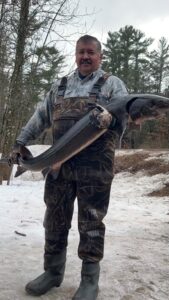 Greetings NAFWS Members, Partners, Friends, and Family:
Greetings NAFWS Members, Partners, Friends, and Family:
My name is Don Reiter, I am very humble to say, your New NAFWS President. I want to thank all the NAFWS Board of Directors for their confidence in me. I will try my best.
In April at our NAFWS National Conference held in Anchorage, Alaska, Elveda Martinez our past NAFWS President, stepped down. I am very appreciative of all that Elveda has accomplished while being NAFWS President. She took over and was able to stabilize the Society. We, at that time, were not doing so good, but today we are really excelling in all phases of natural resource management. Elveda has provided a path to follow will only make my job easier.
I am an enrolled member in the Menominee Indian Tribe of Wisconsin. I have been in the fish and wildlife field all my life, being mentored when I was in eight grade all through high school. My mentors kept me on a straight path and providing plenty of fish and wildlife experience such as lake and stream surveys, wildlife surveys, getting to know how to use the equipment to get the job completed. This continued throughout my college days. There was never a dull moment. This is where I learned what it takes to be a professional. In my current job, I am a Wildlife Biologist working in the Environmental Services Department for the Menominee Indian Tribe of Wisconsin for the past 32 years. I can safely say I may be the last link of the original NAFWS Society Forefathers and today’s Society. I started in 1991, a few years after the start of this great Society and have grown under their experiences. I hope we honor them and carry their original message into the next century.
After reviewing the last few years of the NAFWS, I could write of all the excellent programs the National Office has started, but I will let you see for yourself at the many things in our current NAFWS Newsletter. Dr. Julie Thorstenson, Executive Director, NAFWS has assembled a great staff that compliment one another professions. I am proud of our NAFWS successes over the past few years, particularly in providing more opportunities for meaningful engagement of our members, agencies, and partners. Providing professional development, grant writing, outreach opportunities and all other not listed. In the year ahead, we will continue these initiatives, as well as adding programming designed for the different stages of your career, virtual programming, and events held in collaboration with other natural resource departments and agencies.
There are continual changes going on around us—whether social, political, educational, technological, scientific, economic, cultural, or otherwise—require that we help our tribal natural resources management programs grow with the changes we are experiencing.
Thank you NAFWS members for your continued participation and enthusiasm in our professional community, I’d like to give a special shout-out of appreciation to our NAFWS Board of Directors and our Executive Director, for their tireless effort working for tribes and their lands! They are sacred.
Thank you all!
Wishing you success
Donald J. Reiter, President
NAFWS
Message from the Executive Director
Greetings NAFWS members, partners, and friends. I hope you have been enjoying your spring and summer. I often say the hardest part of my job is condensing all NAFWS has going on into short paragraphs and presentations.
The second quarter of 2023 continued to be busy for NAFWS with several events and increased growth. Our team grew with the addition of six new staff members. Emily Hagler, Fish and Wildlife Biologist-Threatened and Endangered Species; Hannah Golden, Fish and Wildlife Biologist – Biodiversity; Judith McKenna, Administrative Assistant; Wade Reiter, Invasive Species Technician; Annette Bravo, Invasive Species Technician and Thomas Hafen, Invasive Species Technician. You can read more about them HERE. We also welcomed Ashley Miles as our summer intern.
Our 40th Annual National Conference was held the end of April in Anchorage, AK. I was overwhelmed by all the incredible work Tribal fish and wildlife professionals are doing. It was great to see so many of our members, partners, and youth all in one place. I felt like NAFWS had come full circle with the blessing of many of our founders present along with so many of our youth. I cannot thank our host the Chugach Regional Resource Commission and the NAFWS staff, board of directors, members, and partners enough for such a successful event.
The weather delayed the Great Plains Regional Conference but did not inhibit the quality. Thank you to Jeff Kelly and Charles Wilkinson for their hard work in planning and adapting to ensure our Great Plains regional members were able to gather and share the work they are doing.
We are continuing to grow in many ways and are currently advertising and hiring for many positions. We are especially grateful to the Doris Duke Foundation for their support of a full time Grant Coordinator position. Along with conferences, we hosted and attended several events. Please continue to follow us on our website and social media for upcoming events, trainings, and webinars.
I spent a lot of time traveling in June. First traveling to Durango, CO to meet with our partners from the Bureau of Indian Affairs Branch of Fish, Wildlife and Recreation managers. I had the opportunity to present on NAFWS and our new Invasive Species program. I traveled to the Pine Ridge Reservation in South Dakota to take part in a cultural bison harvest, highlighting our partners InterTribal Buffalo Council’s harvest trailer. Thank you to Oglala Sioux Tribe for your hospitality. I attended the International Hunter’s Education Association annual conference in Boise, ID where I had the opportunity to speak about NAFWS and our recent IHEA World Certification for a Tribal hunter education program.
We continue to watch the Recovering America’s Wildlife Act (S. 1149) and actively participate in the RAWA Alliance. We will be coordinating Tribal RAWA Coalition meetings, please contact NAFWS if you are interested in attending. We need to continue to stress the importance of Tribes’ need for base funding for fish and wildlife.
I am reminded daily how blessed I am to work with such a tremendous team to better serve our membership with the conservation, enhancement and preservation of Tribal fish and wildlife resources. As always, if you have ideas for the NAFWS, please contact me or your regional director(s). I hope our paths cross soon.
Pilamaye ye,
Julie Thorstenson, PhD (Lakota)
Executive Director
Message from Outgoing PIO
Hello all,
I have had the immense privilege of serving as your public information officer since January but my time in this position is coming to a close. HOWEVER, I’m not leaving the society any time soon! I will be moving to the America the Beautiful Field Liaison position come September part- time as I create some intentional space to pursue my Ph.D. at the University of Colorado- Boulder in Ethnographic Carnivore Ecology. Julie and the society have been nothing but supportive in my pursuits and I couldn’t be more grateful. Y’all will still see me around but maybe not in your face taking candid photos every chance I get! I’m excited for this new adventure and thrilled that I get to train the next PIO in a position that I know I am going to miss dearly.
Best,
Rosie Sanchez
40th Annual Celebration
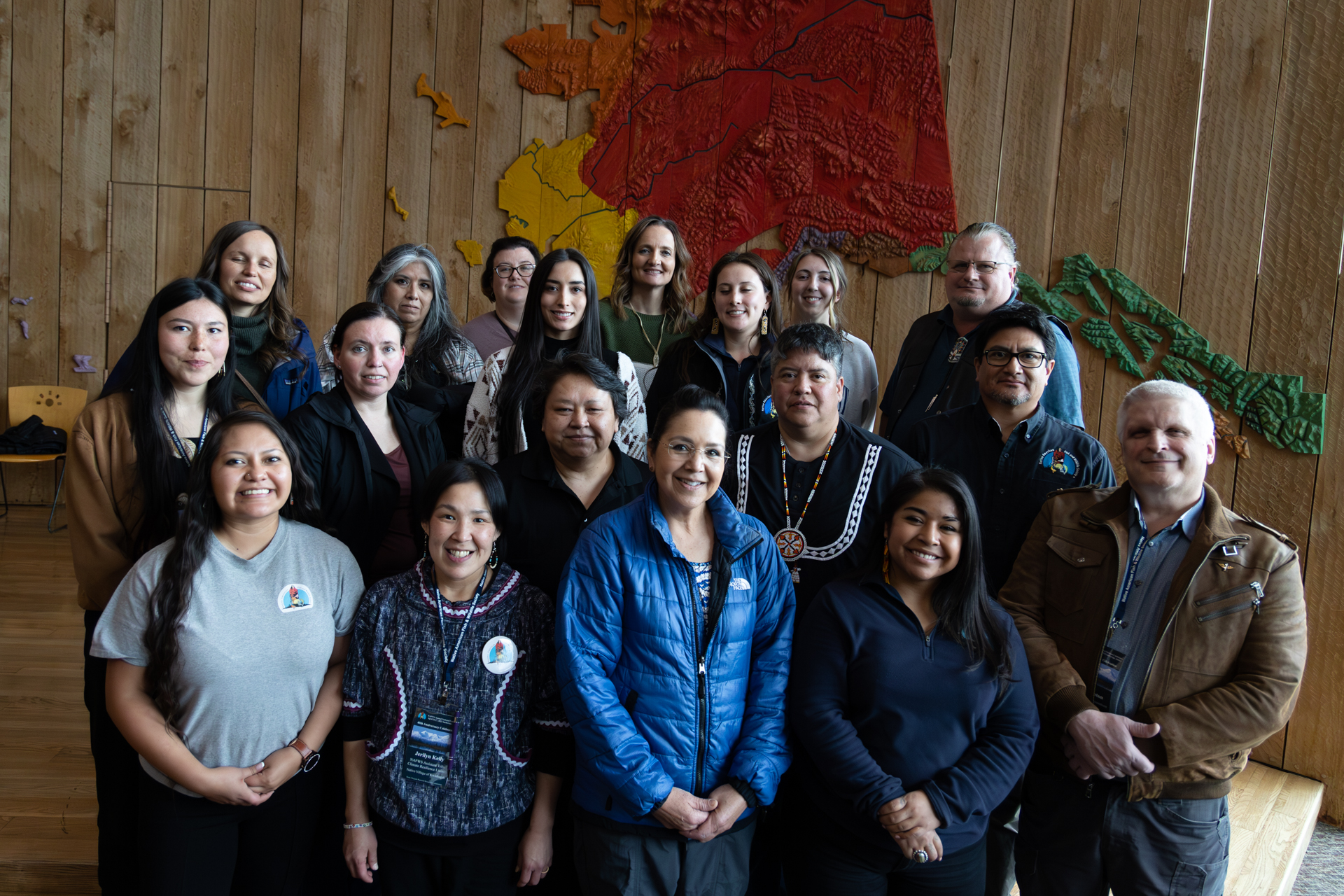
Photo by Ryan Comfort
April 24-27, 2023, NAFWS celebrated our 40th anniversary in Anchorage Alaska at our Annual conference hosted by Chugach Regional Resource Commission! We had 300+ of our national membership join us in Alaska to learn about Tribal natural resource management and participate in our trainings, natural resource tours, awards, and successional planning for our growing organization. The Native American Fish and Wildlife Society was grateful to our conference Keynote Speakers U.S. Representative Mary Peltola and Orville Lind for dedicating their time to speaking to our conference participants and membership. We want to thank all of our 40th annual celebration speakers, presenters, students, and workshop hosts for making our conference this year one of the best experiences for all 300+ participants. We are looking forward to out 2024 National Conference held in the Great Lakes Region; more info to come soon!
Conservation Law Enforcement Officer Update
Robert Romero, Deputy Executive Director
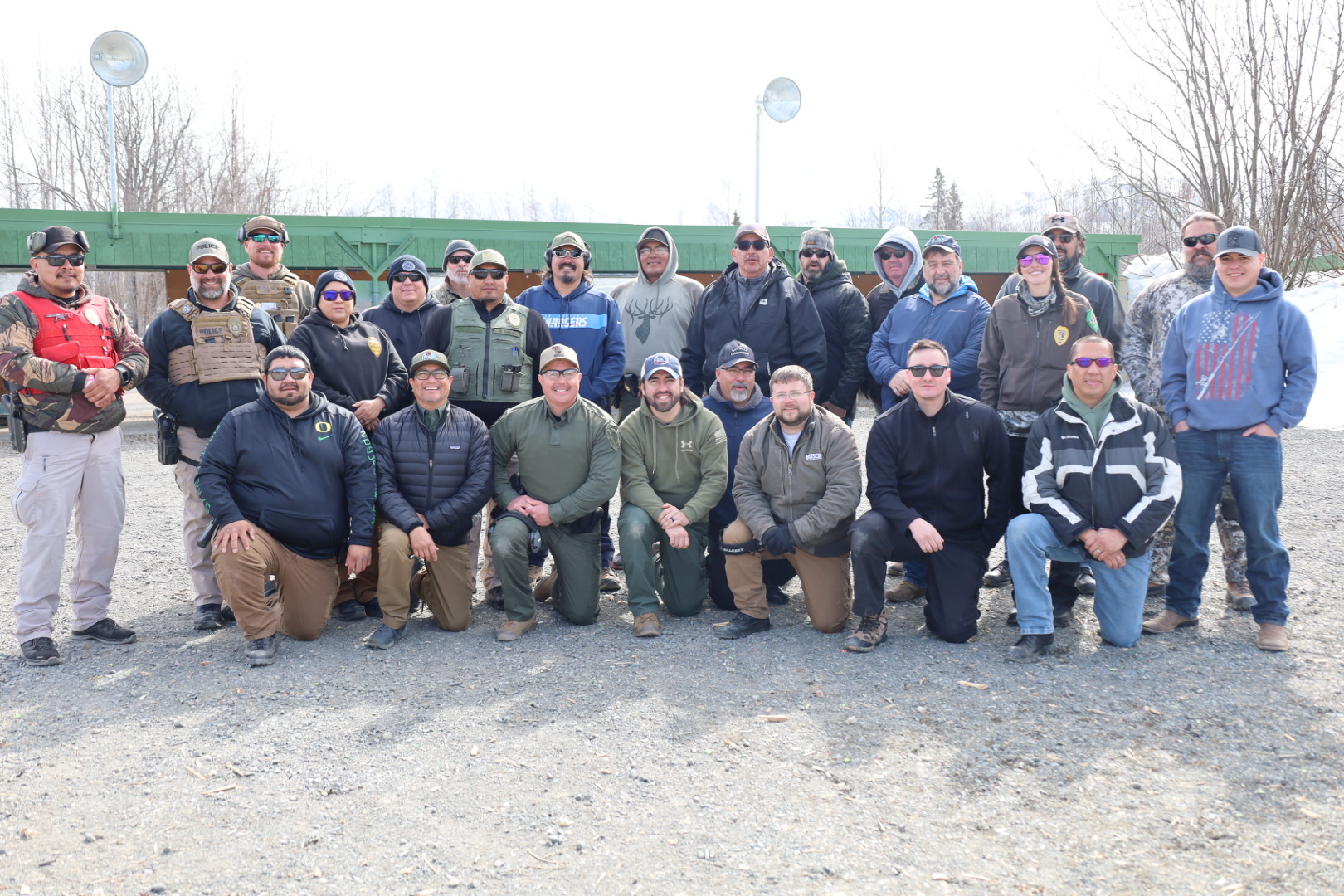
2023 National PPC – Anchorage, AK
Greetings everyone! This past quarter has had limited CLEO specific activities, although we still plan for upcoming events during scheduled Regional Conferences throughout the remainder of the calendar year.
To date, the highlight for the second quarter of 2023 was our 40th NAFWS Annual National Conference in Anchorage, Alaska that was hosted by the Chugach Regional Resources Commission. During the conference CLEOs attended law enforcement related presentations including the use of canines in the conservation world, Federal legal updates, Federal wildlife statute review, Federal wildlife investigation case presentation, and a wildlife health presentation which were all well received. We also held the Conservation Law Enforcement National Shoot Team Competition where teams from the Great Plains, Great Lakes, Southeast/Southwest regions competed for the National Championship.
Results of the National PPC:
Third place: Southwest/Southeast combined team – overall score of 7833.
Team members: Rusty Lacy (Miccosukee Tribe), Ben Shelby (Yavapai-Prescott Indian Tribe), Brandon Tsosie (Navajo Nation), Travis Owl (Ft. Yuma Quechan Indian Tribe), and Nathan Garcia (Pueblo of Santa Ana).
Second place: Great Plains team – overall score of 8288.
Team members: Beaufort Joe, Brad Sage, Jordan Yellowbird and Angela Joe Martinez (Three Affiliated Tribes), and Morgan Tibbits (Oglala Sioux Tribe).
Champions: Great Lakes team – overall score of 8541
Team members: Brad Cameron and Don Carrick (Bay Mills Indian Community); Tim Mallory (Little Traverse Bay Band of Odawa Indians), Ashley Zurn (White Earth Nation) and Henry Bearheart (Lac Courte Oreilles Tribe)
The 2023 Top Gun Award was presented to Beaufort Joe who earned this distinguished honor after shooting the best individual total score of 1770.
Congratulations to all!
The Great Plains Regional Conference was held from May 23-25, 2023 and CLEOs from the Standing Rock Sioux Tribe and Three Affiliated Tribes participated in a regional shoot competition. This was a non-qualifying regional shoot, but Beaufort Joe took the top honors, followed by Jeff Kelly, Larry Brown, Waylon Little Eagle, Brad Sage, Kiefer Demery, Charles Wilkinson and Gary Weasel, in that order.
Planning continues to develop CLEO specific training and shoot competitions for the following events:
- Southeast Regional Conference, August 14-17, 2023
- Southwest Regional Conference, August 21-24, 2023
- Great Lakes Regional Conference, September 10-15, 2023
Lastly, initial planning has begun to develop a 2023 NAFWS 40-hour CLEO Training at the NRA Whittington Center in northern New Mexico that is tentatively scheduled for late September – more details will soon be available on the NAFWS website.
Please feel free to contact me regarding any CLEO needs or concerns that we can possibly use to develop training opportunities for our Tribal officers. Thank you and stay safe!
America the Beautiful Challenge Update
It was all hands-on deck for the NAFWS team when pre-proposals for the National Fish and Wildlife Foundations America the Beautiful Challenge grant was due. We were thrilled so many Tribal applicants reached out for our support and expertise for our review of their pre-proposals; and the work continues! NAFWS was excited to see that 46% of the funding selected to move forward belonged to Tribal applicants and 67 Tribes were invited to move forward. Our team continues to work with the 66 Tribes that have been selected to provide full proposals for the AtBC grant. NAFWS staff held a special AtBC Tribal webinar to reiterate our commitment and dedication to help Tribes be successful in their pursuits to obtain this funding. July 20th is the deadline for full proposals and all staff is again all hands-on deck to provide valuable feedback and edits to full proposals. We are also working on providing feedback to the Tribes that were not selected to move forward with a full proposal in hopes to adopt and implement the suggestions for future applications!
Recovering America’s Wildlife Act (RAWA)
As we come to a legislative recess in August, we continue to push Senate Republicans for support and co-sponsorship of the 118th congress Recovering America’s Wildlife Act. We will continue targeted outreach to garner more support of this vital piece of legislation that would secure base funding for Tribal natural resource management agencies that we do not see from Pittman-Robinson, Dingle-Johnson act funds. Our Executive Director, Julie Thorstenson, Ph.D., was recently featured in this article discussing RAWA ->Tribes doing vital conservation work can’t access federal funds to support it: By Kathleen Shannon – Tribes doing vital conservation work can’t access federal funds to support it : NPR
Staff Updates
NAFWS has been growing significantly since our last newsletter with wonderful additions to our team. Please join us in welcoming the newest staff to the team!
- Emily Hagler, Fish & Wildlife Biologist- Threatened and Endangered Species (Nevada)
- Judith McKenna, Administrative Assistant, (Northglenn, CO)
- Annette Bravo- Invasive Species Technician (Arizona)
- Wade Reiter- Invasive Species Technician (Wisconsin)
- Thomas Hafen– Invasive Species Technician (Oregon)
Education Update
Sun. Youth Summer Camps. Fishin’. Mosquitos. It must be summer time! First, congratulations to all of the graduates for accomplishing a wonderful milestone in your educational careers.
This summer, NAFWS is excited to welcome our summer intern, Ashley Miles. She was raised in Albuquerque, New Mexico. Ashley is a citizen of Santa Anna Pueblo and Hopi Nation. She is currently a student with University of Colorado Denver studying Biology and Business Management, with a certification in Environmental Stewardship for Indigenous Lands. Ashley moved to Colorado for her studies and applied to be a NAFWS intern to further her environmental knowledge. In Ashley’s free time she likes to spend time cooking for family, hiking with friends, and crafting.
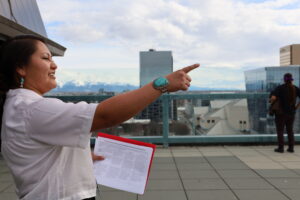 One of the first tasks for Ashley was putting together a resources guide that is geared towards Native youth that contains recommended and educational webinars, readings, books, podcasts and other resources to learn more about natural resources. Please access the resources guide here.
One of the first tasks for Ashley was putting together a resources guide that is geared towards Native youth that contains recommended and educational webinars, readings, books, podcasts and other resources to learn more about natural resources. Please access the resources guide here.
This summer, we have been preparing for the 16 students to travel to the Rockies to attend the 2023 National Summer Youth Practicum scheduled for the third week of July. We have an agenda filled with professional development sessions, a tour of the Colorado State University’s Bison Reproduction Lab, flyfishing with some U.S. Forest Service bios and a lot more.
My big ask to all of our members is to share these awesome opportunities with students that you think will be interested or a great fit!
For more information regarding our education programs, please visit: https://nafws.org/youth-pre-professional/ or contact Ashley Mueller, Education Coordinator
The Bio Corner
Laurel James, Director of Programs
Our BIO team has been busy! In May, Dr. Tolani Francisco, Shailyn Miller-Wiechman, Emily Hagler and Laurel James attended the 4th International Chronic Wasting Disease (CWD) Symposium in Denver, Colorado and were joined by representatives from Ft. Peck Assiniboine Sioux Tribe, the Kalispel Tribe, the Colorado River Indian Tribes, Pueblo of Tesuque, and the San Carlos Apache Tribe. These tribes were active participants in the NAFWS Chronic Wasting Disease project thus, the NAFWS was able to sponsor their travel allowing them to participate and gain the most up to date, historic and on-going research related to this disease, world-wide. Attendees at this conference look forward to “tackling the challenges we face in the coming years to continue to move CWD research forward and find practical plans for mitigation, management, and remediation.” As a result of this workshop and informal gathering of tribal CWD researchers, the NAFWS will formulate a tribal CWD working group and Big Horn Sheep working group that will dovetail nicely with the current Wildlife Corridors working group discussions, led by Mrs. Shailyn Miller-Wiechman. These working groups will form during the fall after Tribal Fish & Wildlife Professionals’ busy field seasons slow down a bit! Sign up and join these working groups by getting in touch with Shailyn. Be on the lookout for information on the upcoming meetings. We are here to provide technical assistance to tribes on these important issues, impacting our tribal way of life.
Shailyn:
The Native American Fish and Wildlife Society held the Tribal Wildlife Crossing Workshop on June 12 & 13th in Durango, Colorado. 26 participants, including 17 tribes, in this workshop participants were provided technical assistance with the application process for the FHWA Wildlife Crossing Pilot Program, as well as being presented with information on wildlife crossing design 101, wildlife-vehicle data collection, partnership/collaboration benefits, and other wildlife crossing grant opportunities. Participants were then given a tour of two wildlife crossings! It was a great few days of sharing wildlife expertise, making new connections, and seeing old friends.
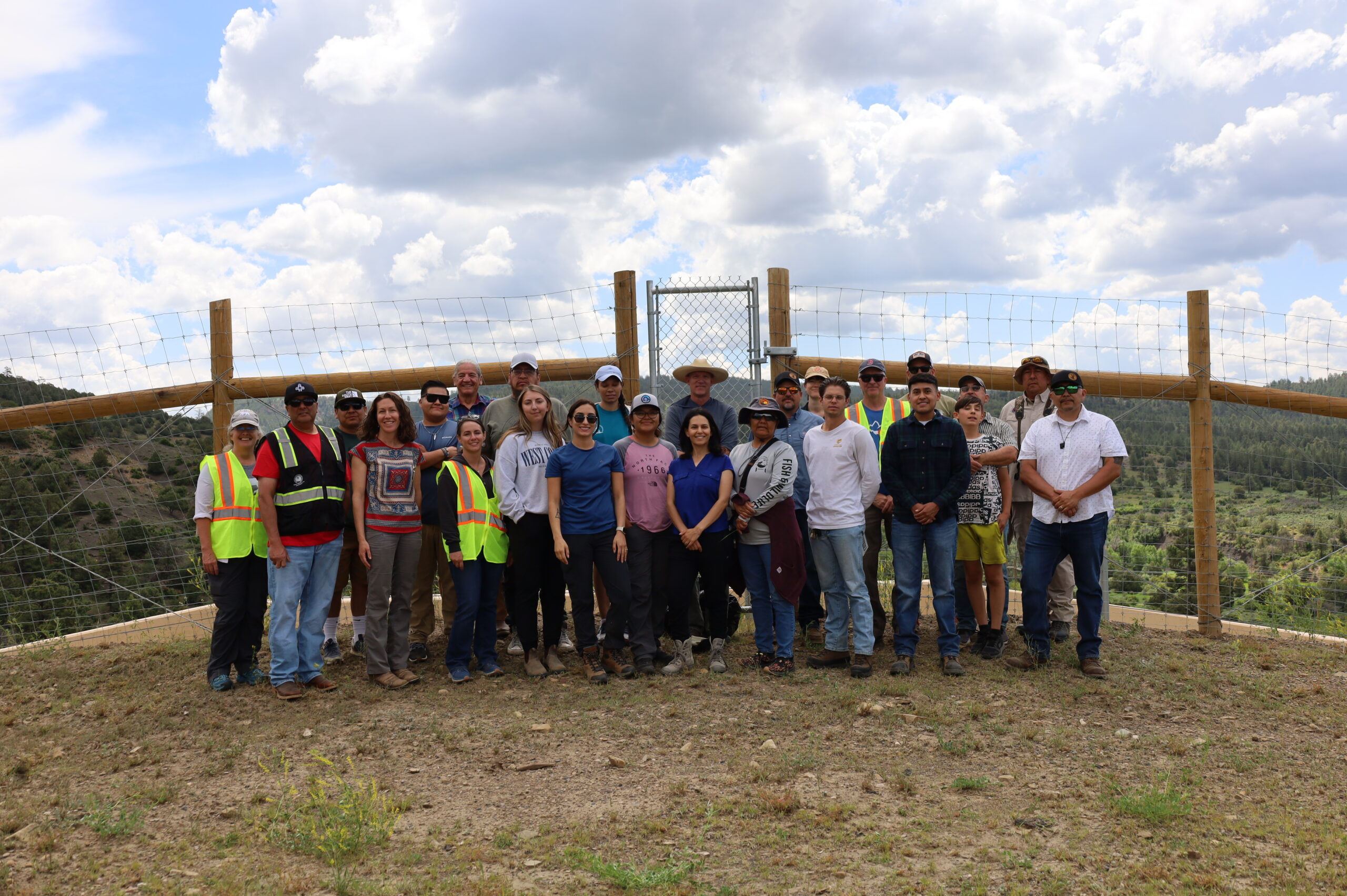
Emily:
In June Dr. Tolani Francisco and Emily Hagler attended the National Wild Horse and Burro Advisory Board (Board) in Reno, NV. This board is composed of representatives from multiple interest groups and the public. The Board meets regularly to discuss issues and to advise the Bureau of Land Management (BLM). Board members represent various interests: wild horse and burro advocacy groups, wild horse and burro research institutions, veterinarians, natural resource organizations, humane advocacy groups, wildlife associations, and livestock organizations, plus the general public with a special knowledge of equine behavior. Board members, are not employees of the federal or state governments, are appointed by the Secretaries of the Interior and Agriculture. While there is no tribal representative on the board John Waconda spoke from a tribal perspective as the Tribal Programs Director for New Mexico and Arizona for The Nature Conservancy. He spoke to the Board about the impacts of overpopulated wild horse and burros to tribal resources, tribal sovereignty, and ability to manage free-roaming equine outside the confinements of the protections of the Wild Horse and Burro Act. One local Northern Nevada tribal member gave public comment regarding their concerns for the impacts to range resources and ability of tribal members to manage free-roaming horses and burros.
Topics of the three-day meeting included BLM and U.S. Forest Service updates, comprehensive ecosystem approach to management, humane treatment and communication, drought, 2023 Herd Management Area (HMA) statistics, 2023 gathering schedule, off-range branch updates, animal welfare, fertility treatments, and population modeling. Extensive public comment was delivered to the Board alongside startling population status statistics. Federal and state agencies are managing free-roaming equine within the confinements of budgetary restrictions, capacity and regulations protecting under the Wild Horse and Burro Act. Statistics presented paint an alarming picture of widespread populations over established Appropriate Management Levels (AML). While great strides have been made in some regions in approaching or meeting AML, populations double every 3-4 years. During an update by BLM it was estimated that there is a total of 82,883 free-roaming horses and burros within their jurisdiction. Maximum AML is 26,785 individuals. A sense of urgency to improve the management of this resource was echoed by many. The President’s budget schedule for fiscal year 2024 slates $154.8 million for management, mainly focused on fertility treatments.
This highly controversial natural resource management issue was met with both concern for animal welfare, and concern for continued habitat degradation. It is encouraged that any tribes concerned about free-roaming equine impacting tribal natural resources reach out to their local state and federal managers to better understand the management of this resource in their region. Furthermore, to reach out to the NAFWS with any questions, staff are available to support tribal programming related to the preservation of native wildlife.
Invasive Species
Invasive Species Makes Sci-Fi Status
Invasive Species! These two words have gained Sci-Fi status in the news media of late. From Giant African land snails causing quarantine in Florida to Australian Spotted Jellyfish washing up on a beach in Texas or even the Northern Snakehead “moving across the Midwest”, the highlights of non-native species can appear more frightening, or even humorous, than informative in nature. Even the terms used in discussions about invasive species contribute to the impression of these species coming from outer space or places like the “black lagoon”. Terms like “alien species” or “sleeper species” add to that Sci-Fi persona making it appear that non-native species are purposely laying in wait to overtake an ecosystem. The complexity of any species’ capability to spread and advance in an ecosystem is not a new concept. The difference is that non-native once established are more difficult to control and often overlooked until the problem is advanced beyond minimal control options.
The proper identification of species, invasive or not, clarifies what species are surrounding you. This general knowledge allows you to know what species you should be coming across and makes you aware of what species you shouldn’t be seeing. It is obvious that awareness and education are key to combatting the spread of non-native species. While we agree that information needs to be publicly broadcasted for people to be made aware of the spread of non-native species, the approach of how these species is portrayed often downgrades the significance of awareness. This is one of the priority areas for the NAFWS Invasive Species Program. To provide awareness of the spread of non-native species across Indian Country is key to help tribal managers in addressing the needs of management and control of those species that turn “invasive”.
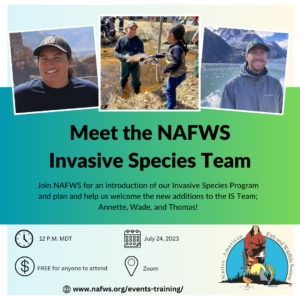 With the introduction of our Invasive Species Technicians, Annette Bravo, Thomas Hafen, and Wade Reiter, to round out the NAFWS Invasive Species Team, we are excited about the additions that each of these staff members will bring to NAFWS that will benefit our members and member Tribes. Our vision is to expand on the NAFWS Mission of “protecting, conserving and enhancing tribal fish and wildlife resources”.
With the introduction of our Invasive Species Technicians, Annette Bravo, Thomas Hafen, and Wade Reiter, to round out the NAFWS Invasive Species Team, we are excited about the additions that each of these staff members will bring to NAFWS that will benefit our members and member Tribes. Our vision is to expand on the NAFWS Mission of “protecting, conserving and enhancing tribal fish and wildlife resources”.
Enjoy us in our “Meet the Invasive Species Team” webinar on July 24, 2023, at 12:00 PM MDT to learn more about the NAFWS Invasive Species Program. Registration for the webinar can be found at www.nafws.org/events-training/.
Funding Sources
NAFWS serves as a hub for funding opportunities available to Tribes. Below are current opportunities for funding. We work to consistently keep you apprised of new funding so be sure to check our Funding Resources Page periodically!
- Bipartisan Infrastructure Law (BIL), Tribal Engagement in Regional Ocean Partnership Priorities: This program complements a separate funding program for established Regional Ocean Partnerships (ROPs), which seeks to enhance and sustain the efforts of those ROPs to coordinate interstate and intertribal management of ocean and coastal management issues. The scope of work under this program focuses on encouraging or enhancing tribal involvement in or engagement with established ROPs, and/or tribal activities related to ROP priority actions. Proposals submitted under this competition must directly relate to priorities of established ROPs, either through tribal engagement in or with ROPs, or tribal activities closely aligned with ROP priorities. Current Closing Date for Applications: August 30, 2023.
- Climate Resilience Regional Challenge: On June 20, 2023, NOAA released the Notice of Funding Opportunity for their new program, the Climate Resilience Regional Challenge, which provides approximately $575 million in funding from the Inflation Reduction Act for investing in holistic, collaborative approaches to coastal resilience at regional scales. Announcement closing date is August 21, 2023.
- Indigenous Animals Grant: The Indigenous Animals Harvesting and Meat Processing Grant Program (IAG) is designed to support the priorities of Tribal Nations in meeting the needs of traditional harvesting methods and indigenous animals. This project intends to fund projects which invest in Tribal Nations’ supply chain resiliency, indigenous animals, restoring local indigenous food systems, and indigenous processing methods, and expanding local capacity for the harvesting, processing, manufacturing, storing, transporting, wholesaling, or distribution (communal or commercial) of meat, poultry, seafood, and other animals that provide culturally appropriate food and food security to tribal communities. The primary purpose of all projects must be to expand or enhance indigenous animals and meat processing capacity in Indian Country. Eligible applicants can submit an application to AMS for 2023 Request for Application by July 19, 2023. If you have any questions about applying for an AMS grant, feel free to contact the grant program’s point of contact listed in the RFA or [email protected].
- National Animal Disease Preparedness and Response Program (NADPRP): The U.S. Department of Agriculture’s (USDA) Animal and Plant Health Inspection Service (APHIS) is awarding $566,626 to support four new cooperative agreements with tribal partners through the National Animal Disease Preparedness and Response Program (NADPRP). These projects will enhance these Tribes’ – and our nation’s – animal disease response capabilities and strengthen APHIS’ relationships with these partners. In October 2022, APHIS announced the availability of funding for proposals in the first-ever NADPRP Tribal Funding Opportunity. For information about the NADPRP program, or if you are a cooperator and need assistance with your project, please contact us at [email protected]
- FY 2023 Plant Protection Act Section 7721: APHIS has set aside up to $4 million in funding to support Tribes, Tribal organizations, and universities as well as other minority-affiliated organizations. Under the PPA 7721’s Plant Pest and Disease Management and Disaster Prevention Program, APHIS provides funding to its partners to help them safeguard against, detect, and respond to invasive plant pests and diseases. Climate change has increased the level of plant pest infestations and disease infection, allowed pests to produce more generations each year, and extended the suitable habitat for plant pests. Closing date for this funding opportunity is September 6, 2023.
- BIL-ER Bison Project – The Bureau expects to provide $1.5 million in BIL-ER competitive Bison funding for 3 projects at $500,000 each. The attached, Bureau of Indian Affairs – Bison Program, Ranking Criteria and Application Process, provides guidance for those interested in participating in this program (attachment)
- Lenfest Ocean Program- Including indigenous Knowledge in Ocean and Coastal Evidence-Based Decision making: The Lenfest Ocean Program seeks to fund projects that elevate Indigenous Peoples in sharing their traditions, culture, knowledge, and wisdom to improve evidence-based decision-making for the management, conservation, and restoration of coastal marine species, habitats, and ecosystems. Thus, the Lenfest Ocean Program is issuing a request for proposals (RFP) to support: Identification, analysis, and/or communication of Indigenous Knowledge and wisdom (where it is culturally appropriate); and Engagement approaches that facilitate the inclusion of this knowledge into ocean and coastal management decisions.
Strategic Operating Plan Survey
NAFWS has experienced rapid growth and significant changes over the past 3 years. We are developing a new 3-Year Strategic Operating Plan to make strategic decisions, establish priorities, and be intentional about future growth and development. We created a digital survey to get our memberships’ input on the future of NAFWS. This survey should take 5-7 minutes to complete, and your feedback will be valuable to our Strategic Planning efforts.
Here is the link to our survey: SURVEY LINK
Please complete this survey by Friday, July 21st.
Upcoming Events & Jobs
As always, we have so much on our calendars to look forward to. Be sure to check out our events page regularly for in person trainings, events, and webinars to help in your professional development! We also have our job board that is chalk full of new internal as well as external jobs updated daily!
NAFWS in the News
- Our very own Ashley Mueller, M.S., NAFWS Education Coordinator, has been selected to participate in the 17th cohort of the National Conservation Leadership Insititute! The NCLI successfully defies the ordinary, acting to preserve the legacy of natural resources by developing extraordinary conservation leadership. The unique curriculum challenges assumptions, piques critical thinking, fosters high-trust relationships, and strengthens confidence. We are so proud of Ashley, and we will be sure to give you updates of her journey!
- Shailyn Miller-Weichman, NAFWS Wildlife Connectivity Coordinator, has also been selected as a member of The Wildlife Society’s Leadership Institute! TWS Leadership Institute is an annual course established in 2006 to provide a select group fo 10-15 promising TWS members with leadership training. The Leadership Institute consists of intesive activities and mentoring relationship that prepare participants for leadership positions in their workplace and TWS. We are so impressed and proud of Shailyn!
- Rosie Sanchez, Public Information Officer, will participate in Resources Legacy Fund‘s western conservation communications hub digital communications cohort designed to help nonprofit organizations in building communications capacity and advancing narrative change around conservation issues in the West. NAFWS was one of 6 organizations that was chosen to participate in this cohort.

